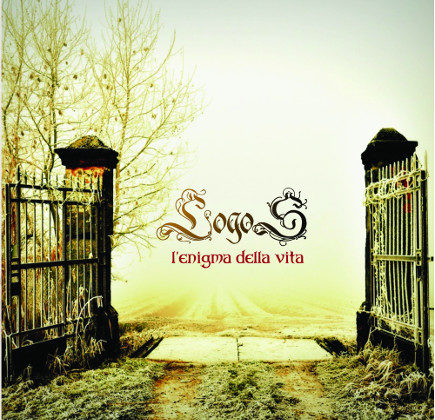L’enigma della vita (The enigma of Life) is the third album by Logos, an Italian prog band from Verona that was formed in 1996. It was released in 2014 on the independent label Andromeda Relix with a renewed line up featuring Luca Zerman (organ, Mellotron, synthesizer, vocals), Fabio Gaspari (drums, bass), Claudio Antolini (piano, keyboards, synthesizer) and Massimo Maoli (guitar) plus some special guests as Alessandro Perbellini (drums), Simone Bistaffa (guitar), Simone Chiampan (drums) and Gianbattista Bodei (narrative vocals). A long time has passed from their previous work Asrava, from 2001, but during all these years the band never stopped and kept on working on the new compositions, refining them, recording them without pressure nor hurry, with care, determination and love. The result is an excellent concept album conceived as a long suite about the life, nature and time passing by, a mature work where the band showcase great musicianship and personality blending vintage sounds, poetry and new ideas. Well, the beautiful artwork by Luca Zerman and all the images that you can find in the booklet perfectly fit the poetical strength of the lyrics and the evocative power of the music: probably they can help you to understand the concept better than all my words… The dreamy opener “Antifona” is a short instrumental track that sets the atmosphere and fades in the following “Venivo da un lungo sonno” (I was awakening from a long sleep) where a pulsing rhythm conjures up the image of a night train running through dark shadows and ethereal, lunar landscapes. In a wagon a passenger wakes up at the noise provoked by a drought against the curtains. He emerges from a long sleep and can hear some people nearby speaking in a foreign, unknown language. It’s still dark, the mysterious passenger has forgotten his destination and now he’s on his way leading to nowhere, lost in the mist…
Next comes the disquieting “In fuga” (Running away) where the music and lyrics draw the image of some soldiers in the snow. They’re running away from the battlefield seeking for freedom. Their life is hanging on a thin rope while around them the storm is raging… The following “Alla fine dell’ultimo capitolo” (At the end of the last chapter) is filled with tension and dark visions and depicts an empty town where a fugitive man looks for a shelter from the storm. He walks alone among ruins and crumbling walls but he can feel something in the air, the streets seem haunted by strange presences. Suddenly he sees a dim light glimmering through the dust, a pale flame of life and hope. A ghost gets close to him and tells him to keep that flame burning…
“N.A.S.” is a charming instrumental track that every now and again reminds me of Le Orme and Banco del Mutuo Soccorso and makes me think of a glider taking off towards distant planets where there are rivers of lava and creatures generated by earth and electricity. It leads to the ethereal, reflective title track, “L’enigma della vita” (The enigma of life), where the music and lyrics raise questions about the origin of life: was it just the result of vibrating atoms clashing against each other at random or rather the mathematical product of a superior maker? The answer is hidden inside every man but we can’t catch it, we keep on running after forces that we can’t understand and we are always left in doubt, wandering in the dark and trying to learn how to overcome our ignorance, in vain…
“In principio” (In the beginning) is a long, complex track about the mystery of creation and the relativity of time. It starts softly by an acoustic guitar arpeggio, then goes through many changes in mood and rhythm taking you on a mystical trip across the universe. Stars and planets come to life and die as the men who claim to be the masters of the universe. The wisdom of a superior hand carved and shaped indescribable forms and painted the deserts with infinite colours, gave life to rivers and human beings… In the beginning there was nothing, from nothing we came and we’re bound to return to nought…
“Completamente estranei” (Completely aliens) takes us back to Earth. This track starts by painting haunting notes in deep red colours and conveying a strong sense of tension… Here the music and lyrics depict a little tunnel that opens on a side-walk corner. It’s the entrance to the hidden part of the city where live the homeless and the poor. The people who pass every day by that place never notice it, they can see distant stars and planets but not the unfortunate men and children in rags who live underground. For them they’re nothing but transparent aliens coming from another world…
“In quale luogo si ferma il mio tempo” (Where my time stops) is a melancholic, classically inspired instrumental track for piano solo that leads to the epic “Pioggia in campagna” (Rain in the country), a complex track that depicts in a very curious way the relationship between man and nature. The lyrics draw a parallelism between a man and a feather floating in the air that the first gust of wind will sweep away. He can hear what the leaves on the trees have to tell, he can see how the nature takes his revenge on the wrecks of old cars and trucks that are collapsing in a field, covered by grass and already half-swallowed by the marshy ground… No one can save men and their work from the imperceptible fury of time! The following “Il rumore dell’aria” (The noise of air) closes the circle. It’s a short track featuring narrative vocals that takes you back to the starting point, to a man emerging from a long sleep. We can’t say how long he had been sleeping, maybe centuries or millennia. We don’t know where he fell asleep, maybe under an oak in springtime or on the bank of a river in winter. We can’t say when time stopped, all we know is that it was the noise of the air to wake him up and that perhaps he had not been sleeping more than a minute…

